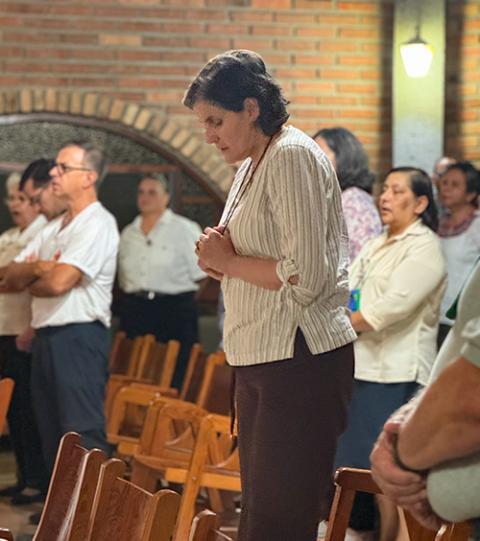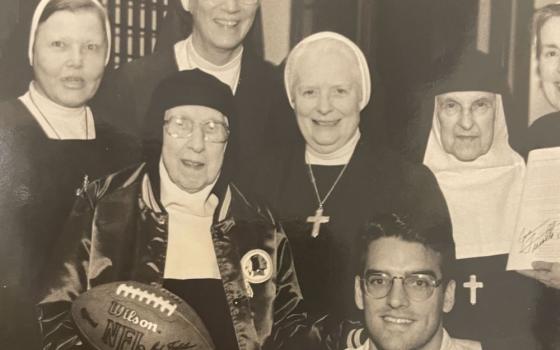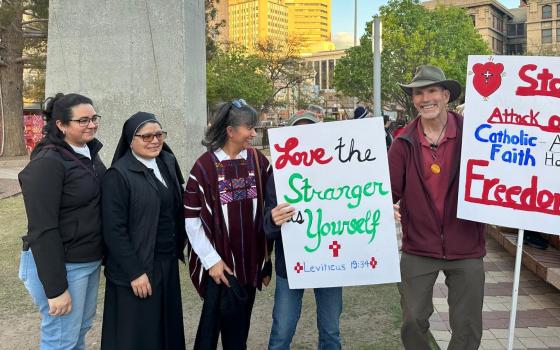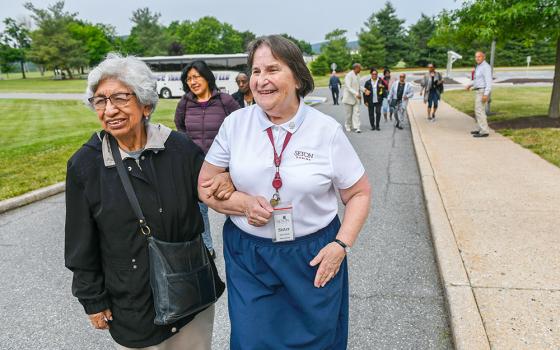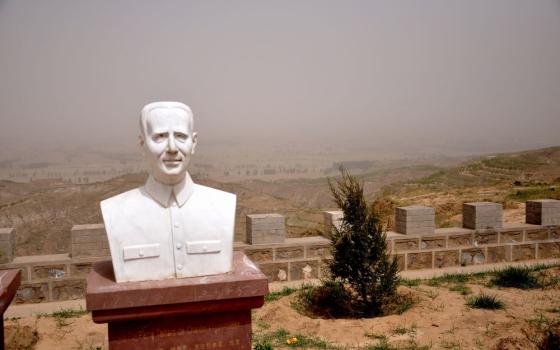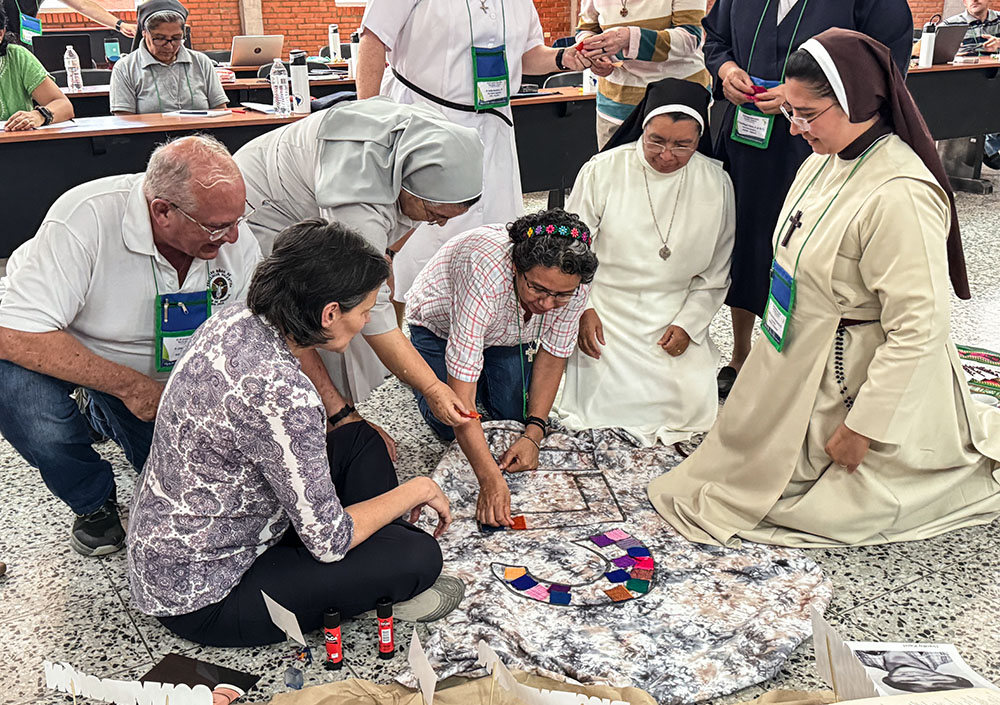
Members of the Confederation of Latin American and Caribbean Religious, known as CLAR for its Spanish acronym, put together an altar decoration April 18 at the Catholic University campus in Las Tres Rosas, Honduras. Some 60 general secretaries, presidents of religious conferences and theologians representing the board of the largest organization of women and men religious in Latin America and the Caribbean gathered for its annual meeting to talk about consecrated life in the region. (GSR photo/Rhina Guidos)
Leaders from the largest group of women and men religious in Latin America and the Caribbean said in an April 18 meeting in Honduras that consecrated life in the Americas must keep calling out injustices, in light of events taking place in the hemisphere.
From persecution of church members in Latin America, as well as fighting for the growing numbers of the poor and excluded, consecrated life is "called to recover its prophetic voice," Sr. Daniela Cannavina, general secretary of the Confederation of Latin American and Caribbean Religious (CLAR), said at the organization's annual board meeting.
Speaking to some 60 general secretaries, presidents of religious conferences and theologians from Latin America and the Caribbean gathered at Honduras' Catholic University campus in Las Tres Rosas, Cannavina told the women and men of CLAR's board to pray and reflect on the organization's richness of prophets.
"That is why we wanted to put before you, images of some of the hundreds of prophets who irrigated our continent with their words and blood," said the Capuchin Sister of Mother Rubatto, referring to a display of photos and renderings of women and men religious — as well as lay companions and diocesan priests — martyred in Central and South America in the 20th and 21st centuries.
The display, set in the middle of the room where the group gathered, included two Maryknolls and an Ursuline from the U.S. killed in El Salvador in 1980, several Jesuits, a U.S.-born member of the Sisters of Notre Dame de Namur killed in Brazil in 2005, and an Augustinian Recollect missionary sister as well as a Salesian, killed for their defense of the poor or the environment.
CLAR turned 65 this year and represents 150,000 women and men religious. Company of Mary Sr. Liliana Franco, president of the organization, told the group that CLAR must be a continuation of their predecessors' prophetic work, given the difficulties populations in Latin America and the Caribbean are facing, including corruption, political instability, massive migration, economic inequality, spiraling violence, persecution and climate change.
Even in that environment, women and men religious, like their predecessors, remain by the side of those who suffer most because of those conditions, Franco said.
"Let us give thanks [for women and men religious], for those who are with us and those who have gone," she said. "For the prophets who still continue to speak through the echo of their voice ... let us give thanks for consecrated life resisting in Nicaragua, for religious life in Haiti trying to keep hope alive."
An untold number of religious, including bishops and sisters, have left or been expelled by the Nicaraguan government, following persecution of some Catholic Church members, and the current crisis of violence in Haiti has produced kidnappings of priests, women religious and men religious, as well as killings.
At the opening Mass of the April 18-21 meeting, CLAR members placed two pieces of blue and green felt in the shape of Nicaragua and Haiti in front of the altar as women and men religious placed their rings, crucifixes, flowers and other personal items on top as a show of solidarity with religious life in the troubled nations.
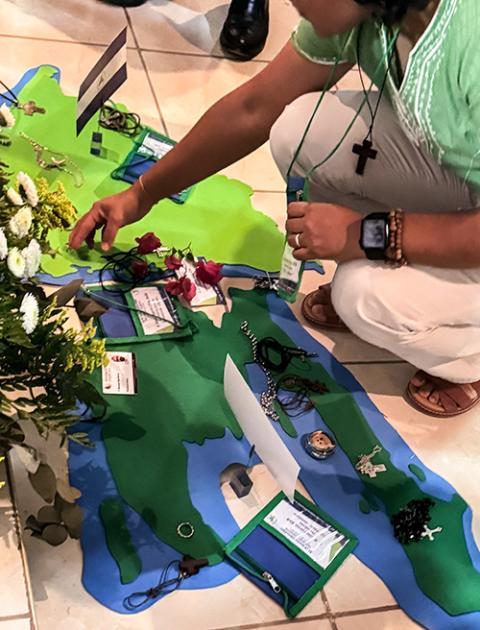
A member of the CLAR places her crucifix on top of a piece of felt in the shape of Haiti in front of an altar before Mass begins at the Catholic University campus in Las Tres Rosas, Honduras, April 18. (GSR photo/Rhina Guidos)
"We want to embrace and be with them in their resistance, to continue building hope in the midst of pain," said Fr. José Luis Loyola, superior general of the Congregation of the Missionaries of the Holy Spirit, who celebrated the April 18 Mass.
Yet many of the women and men religious in the assembly were facing daunting conditions of their own at home or in the countries where they serve.
Those from Cuba spoke about food and fuel shortages making it difficult to carry out their missions, as well as the difficulty of Catholics practicing the faith amid limited religious freedom. Others spoke of crumbling social and economic conditions leading to an exodus of Catholics throughout Latin America.
But many also spoke to Global Sisters Report of the love of those they serve, largely the poor, the elderly, the excluded or forgotten, those who stay or have been left behind.
Dominican Sr. Cynthia Folquer spoke of the eight-hour horse ride up a mountain she has taken time and time again over 30 years up to Tucumán, Argentina, to visit Indigenous communities she has written about and researched.
Piarist Fr. Ricardo Alberto Sola, head of the Cuban Conference of Religious Men and Women, played for the group a WhatsApp audio of a woman who makes rosaries in Havana, telling her story of faith and survival, and later gifting those rosaries to the group.
Another sister spoke to GSR of her prayers to keep quietly serving under her country's regime of fear.
To the group, Franco spoke of the grace God had bestowed by choosing them to serve the downtrodden.
Advertisement
"We are those whom God has looked upon to entrust with his most exquisite mission," Franco said.
But in light of dwindling vocations — and with consecrated life facing challenges in Latin America — CLAR at 65 needs to look at how it will continue forward, attendees said. They spoke of examining the organization's structures, looking at the importance of mission, the role of women, of community life for religious congregations, how the coronavirus pandemic affected religious life, how the synod will help religious life work with others, and the changes to come in a "new epoch."
"We need to revisit things that we think need to change," said Sr. Cristina Robaina, of the Society of St. Teresa of Jesus in Uruguay. "We need to be a more synodal church. That's not optional."
Cannavina said consecrated life in the region can help "the church today to understand the spiritual and social implications of this moment, in which we must illuminate, encourage, accompany."
To do that, added Franco, "requires us to sharpen our gaze, to capture the urgencies of this historical moment."
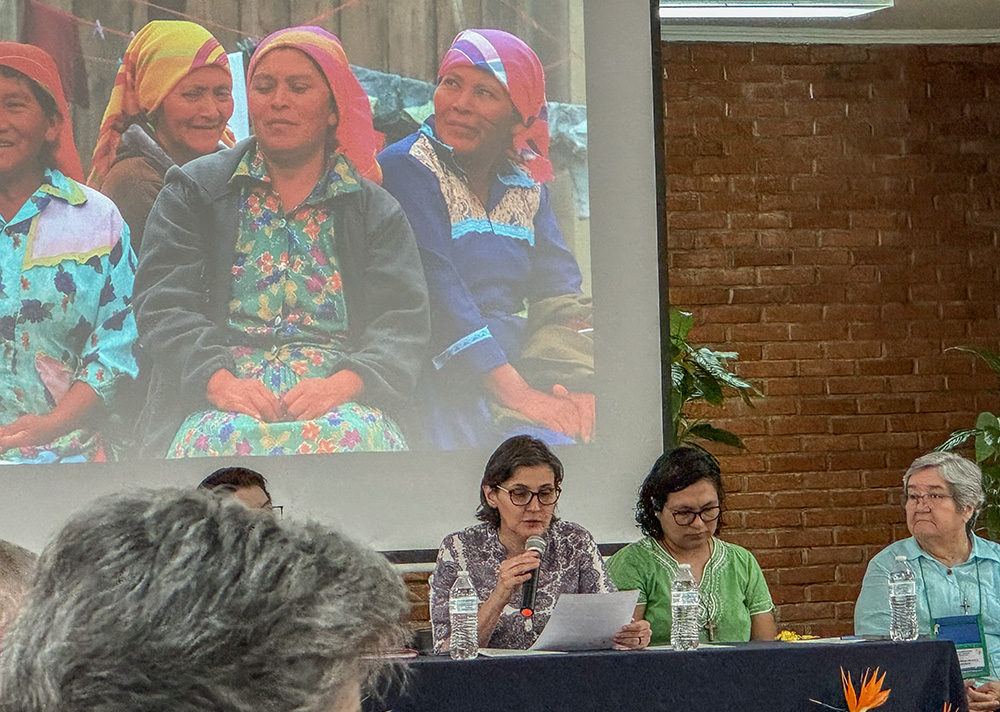
Company of Mary Sr. Liliana Franco, president of the Confederation of Latin American and Caribbean Religious talks at the Catholic University campus in Las Tres Rosas, Honduras, April 18. Franco encouraged women and men religious of CLAR’s board to imitate the women who weave the colorful fabrics typical of Honduras: Be patient, communal, allow the work to transform what they come into contact with. (GSR photo/Rhina Guidos)
It involves, too, acknowledging the church's own crises, including that of abuse, she said, to be "aware of the historical and institutional sin that has left so many victims and produced so much pain."
"We have to try a new way of being 'church,' more synodal and community-oriented ... less powerful, more brotherly and sisterly," she said. "Faced with the thousands of migrants who walk the streets and plazas of our countries, we also have to leave our daily zones of comfort and grow in mercy and solidarity, to lend a helping hand."
In that environment, religious life is called to live with more authenticity, accepting its fragility but also answering the call to be prophets, Franco said. She encouraged women and men religious to, in the midst of turmoil, imitate the women who weave the colorful fabrics typical of Honduras: Be patient, communal, allow the work to transform what they come into contact with.
"[They] invite us to walk to the rhythm of the Spirit, driven by its creative energy," Franco said. "To venture out, go on a journey, dance, go far, conquer other geographical and existential realities, to approach other frontiers, contemplate other landscapes ... to let ourselves be led, even at the risk of making mistakes, but without falling into the temptation of giving up, of not trying, of doing it alone, of looking inside ourselves and not have our gaze on Jesus at all times."

